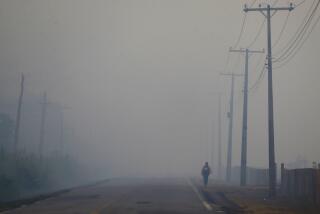Drive to Preserve Amazon Sparks Nationalistic Reaction in Brazil
RIO DE JANEIRO — International pressure for the preservation of Amazon rain forests has triggered a defiant barrage of nationalist reaction in Brazil.
President Jose Sarney has declared repeatedly in recent weeks that Brazil will accept no Amazon conservation proposals that infringe on Brazil’s sovereignty. Some foreign proposals have called for international supervision of Amazon conservation programs as a condition for financial aid or foreign debt relief.
“There is no amount of international money that can buy even a square meter of Brazilian Amazon soil,” Sarney told a Brazilian newspaper last week.
This week, in a nationally broadcast message on the economy, the president vowed that Brazil “will never accept the internationalization of the Amazon.”
Position Restated
Foreign Minister Roberto Abreu Sodre has re-emphasized the government’s position, saying, “The responsibility for preservation of the environment of Brazil belongs to the Brazilian government, not to foreign enterprises or institutions.”
Others have criticized international lending institutions such as the World Bank for requiring conservation measures as a condition for new loans.
“This is becoming a clear intervention in our country’s domestic affairs by international financial agencies,” Sao Paulo businessman Lajos Attila Sarkosy wrote in a guest newspaper column.
Agronomist Fernando Penteado Cardoso suggested in another column that “a well-orchestrated campaign” is being conducted by Brazil’s foreign competitors on international commodities markets to prevent further expansion of Brazilian agricultural capacity in the Amazon.
Sergio Cardoso de Almeida, a right-wing politician, has proposed a new patriotic slogan for the country: “The Amazon is ours.”
“The energy, mineral and agricultural potential of the Amazon, in addition to being our national patrimony, demand a burning and patriotic nationalism from the Brazilian people to not let any outsiders stick their nose in our sovereignty,” Almeida said.
In October, Sarney announced new decrees for controlling deforestation. The decrees suspended tax breaks, credits and other incentives for development in forested areas, imposed strict limits on the expansion of Amazon cattle ranching, temporarily prohibited the exportation of unmilled logs, and ordered new studies to determine what forest areas should be preserved.
A seminar of Amazon conservationists called the measures “an important step, but still timid and insufficient.” The seminar said that for the measures to be effective, government agencies responsible for carrying them out must be strengthened.
Fernande Cesar Mesquita, the newly appointed director of the government agency in charge of forest conservation, said this month that he has only about 50 forest rangers for the entire Amazon region. In a newspaper interview, Mesquita said he does not have funds in his budget to hire more rangers, but he ruled out any international supervision of Amazon forests.
“No way,” he said. “That we will not accept.”
More to Read
Sign up for Essential California
The most important California stories and recommendations in your inbox every morning.
You may occasionally receive promotional content from the Los Angeles Times.










